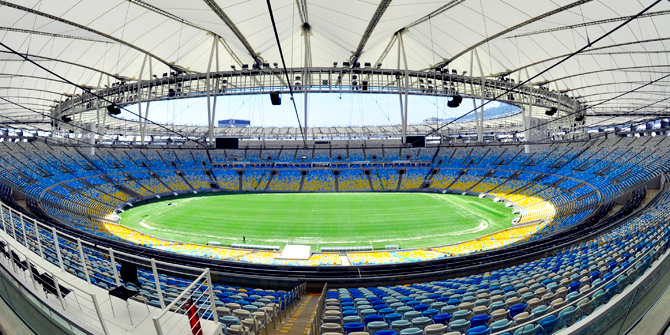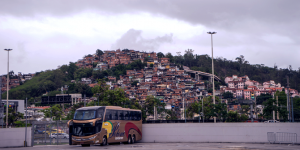
In 2009 Rio won the race to host the Olympics amid a wave of Brazilian optimism, however in 2016 some Brazilians are feeling less than enthusiastic about the games. Flavia Donadelli and Bruno Queiroz Cunha argue that the discontent and controversy surrounding Rio 2016 highlights the deep-seated political, social and economic problems that Brazil needs to address.
The optimism of 2009
The Olympic Games started last week in Brazil, but the lighting of the Olympic flame does not seem to have sparked much enthusiasm among Brazilians. Discontentment of this sort, which has emerged in several host countries, has tended in most cases to dissipate after the opening ceremony. In the case of Rio, a more generalised resentment towards the current political and economic climate in the country added fuel to the already-controversial preparations, the criticisms of broken promises and unmet targets. Whether or not the Games themselves will prove a rejoinder to the negative headlines remains to be seen, but this moment definitely calls for reflection on the reasons behind the gloom.
Brazil won the right to host the Games back in 2009, when it was the middle of an economic boom that pulled more than 40 million people out of extreme poverty. Brazilian commodity exports to China were increasing to unprecedented levels and very high ‘Chinese-like’ growth rates were impressing international media analysts who pointed to the ‘Brazilian take-off’. After enduring hyperinflation (until the early 1990s), constant economic and political instability, and social inequality, Brazilians started to flirt with the idea that they had, finally, learnt their lessons: that the economy could be stabilised, that democracy could be consolidated and that extreme poverty could slowly be tackled.
Nothing seemed more appropriate at that moment than to put the icing on the cake and show off to the rest of the world the vibrancy of those stunning achievements through an Olympic bid. Brazilian hyper-popular president Lula da Silva was, by then, unabashedly stating that mega-events such as the Olympics and the Football World Cup were ‘rites of passage’ for the country to an era of greater prosperity.
Deep-seated problems need to be addressed
Unfortunately, the images of the Games that have been shown to the world are already much different from what was initially expected. Videos such as the polemic Olympics advert, in which the police chase a little boy through the favela as he tries to give a wallet back to a stranger (who turns out to be the football player Ronaldinho), convey both the happiness sports can provide and shed light on the astounding behaviour of Brazilian police; still mostly a military organisation 30 years after the end of Brazilian military regime. The Brazilian military police, one of the organisations that will be protecting tourists and athletes in Rio over the next few days, is tainted by a history of severe civil rights abuses, which even led the U.N. Council on Human Rights to recommend its complete dissolution in 2012.

In addition, Brazil has been through one of the worst economic and political crises in its history. International trade with China, and commodities exports more generally, have lately been under great pressure. Internally, middle and lower-middle class consumption, another growth engine over the last few years, has given way to ever-growing levels of indebtedness in that same group of the population. Unemployment rates recently surpassed the 10% mark in a country that was, just a few years ago, bragging about full employment.
If that was not enough to bring spirits down, the President, Dilma Rousseff, was removed from office in May 2016 due to accusations of creative accounting. She is currently going through a nebulous impeachment trial, which has been often (and not unjustifiably) compared to a coup d’état due to the weakness of its juridical claims against her. The interim president, and Rousseff’s former vice president, Michel Temer, who suffered the embarrassment of being loudly booed by the crowd in the Maracanã stadium during his few-second-long appearance at the Rio 2016 opening ceremony, has been unsuccessful in building an image of a leader and is rejected by the majority of the electorate.
What these events show, perhaps, is not that Brazil has regressed, but simply that the optimism that characterised 2009 was built upon the illusion that the country’s structural problems were being solved to the same extent that exports and consumption figures were increasing. Rather, the deep-seated problems that stem from, and feed off of plutocracy and parochial elite culture, for the most part have not been addressed. If public education and health have indeed improved, these remain areas mired in problems. Brazil’s staggeringly regressive tax system, in turn, is a politically protected area and nearly unchangeable, even in the face of the absurdity of the burden it inflicts on the economy and on the poorest.
Has the Olympic movement outgrown its ideals?
On the other hand, by zooming out from Brazil, further explanations for these disappointments can be found. The Olympic movement may no longer be appropriate for its original purposes. The scale that the Games have reached, in terms of the required financial commitment for host countries, and the highly questionable interventions of the IOC in national legal systems, have turned hosting an Olympic project into a pointless challenge for any democratic nation. It is not surprising that other host cities such as London faced discontentment and criticism in the aftermath of Olympic Games, even if they had been internationally celebrated as a success. For Rio the popular uproar may have not yet consolidated sufficiently, but abundant tax relief for multinationals, great social pressure in poor areas and processes of gentrification are evident and will certainly be part of post-Olympic debates.
The result is now clear: a castle of dreams and promises for ‘rite of passage’ events was built on a foundation of quicksand into which everything began to sink before the photographers could even arrive. All we can hope for is that the stories of shining victories and the formidable physical and emotional challenges that the athletes will face during these short weeks can flood Brazilian hearts with optimism and elevate their spirits to the daunting task of keeping the torch burning.
Flavia Donadelli is a PhD Candidate in Political Science in the LSE Department of Government where she also completed an MSc in Regulation in 2012.
is a PhD Candidate in Political Science in the LSE Department of Government where she also completed an MSc in Regulation in 2012.
 Bruno Queiroz Cunha is a PhD Candidate in Public Policy at Federal University of Rio de Janeiro. He completed an MSc in Regulation at the LSE Department of Government in 2010.
Bruno Queiroz Cunha is a PhD Candidate in Public Policy at Federal University of Rio de Janeiro. He completed an MSc in Regulation at the LSE Department of Government in 2010.
Note: this article gives the views of the authors, and not the position of the LSE Department of Government, nor of the London School of Economics.





